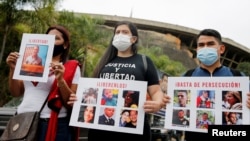U.N. investigators say Venezuela's military and civilian intelligence agencies play a key role in repressing dissent through violent means to keep President Nicolas Maduro in power.
In its latest report to the U.N. Human Rights Council, the Independent Fact-Finding Mission on Venezuela says the two agencies are part of a well-coordinated structure created to retain Maduro's grip on power by keeping the civilian population in check through a policy of fear and intimidation.
It says many of the brutal tactics employed by the military intelligence service, known as DGCIM (the Directorate General of Military Counterintelligence) and the civilian intelligence agency, SEBIN (Bolivarian National Intelligence Service) could amount to crimes against humanity.
The report documents grave human rights violations committed by both agencies, including allegations of torture and other ill-treatment, sexual and gender-based violence, arbitrary detention, and enforced disappearance.
Chair of the Fact-finding mission, Marta Valinas said the mission has evidence proving these crimes were not committed by individuals who had no connection with these agencies.
"Quite the reverse," Valinas said. "The DGCIM and SEBIN are part of machinery put in place and deployed for the execution of a government plan which aims to repress those that are perceived to be its opponents and to consolidate, thereby, its control of power. Its plan was therefore orchestrated from the highest political level."
Valinas added that human rights violations by both agencies continue.
The mission also focused on the situation in the mining region, particularly on the state of Bolivar in southern Venezuela. In 1916, the government established the Arco Minero del Orinoco, a National Strategic Development Zone to extend its control over the gold industry.
Valinas said the militarization of the region has been progressive since then, and armed criminal groups openly control mining regions in connivance with the military and trade unionists.
"Residents of the region have been caught in the crossfire of this violence for control of the gold in the mining region,” said Valinas. “State and non-state actors have committed crimes and human rights violations including murders, enforced disappearances, extortion, corporal punishments, and sexual and gender-based violence. The authorities have not taken sufficient measures to prevent and investigate such abuse."
Venezuela’s Ambassador to the U.N. in Geneva, Hector Constant Rosales, rejected the report, calling it politicized. He accused investigators of inventing everything in the report and using unreliable sources, saying anyone familiar with what truly is going on in Venezuela will know it is fake news.




